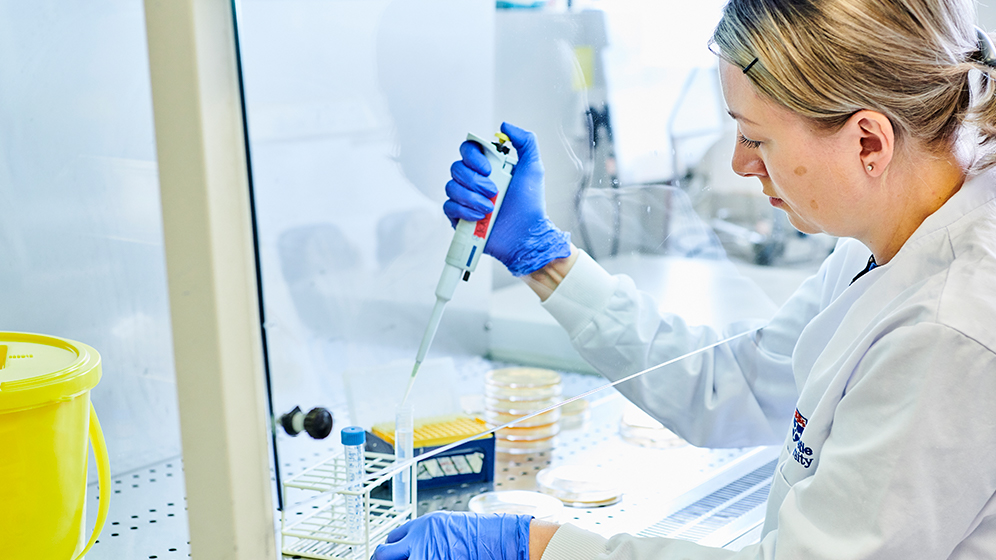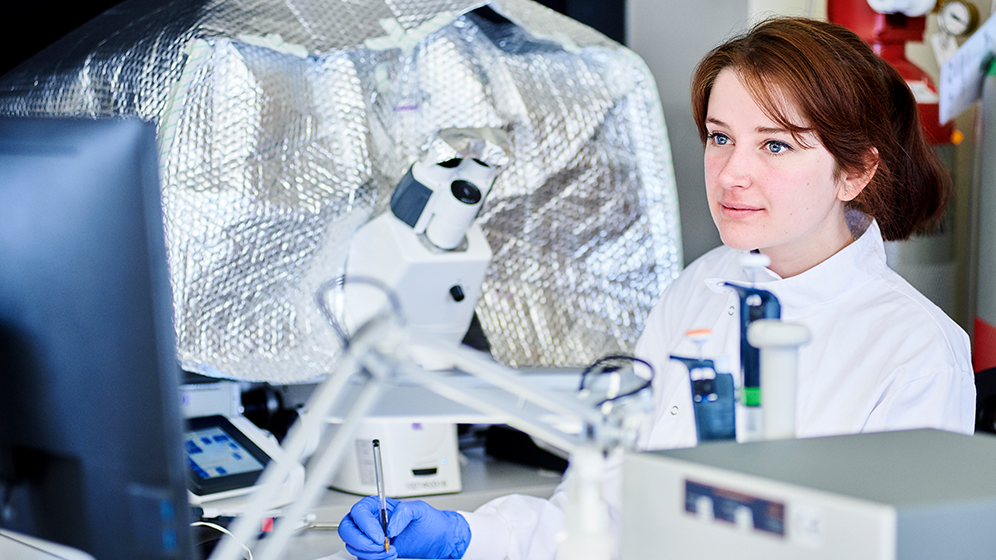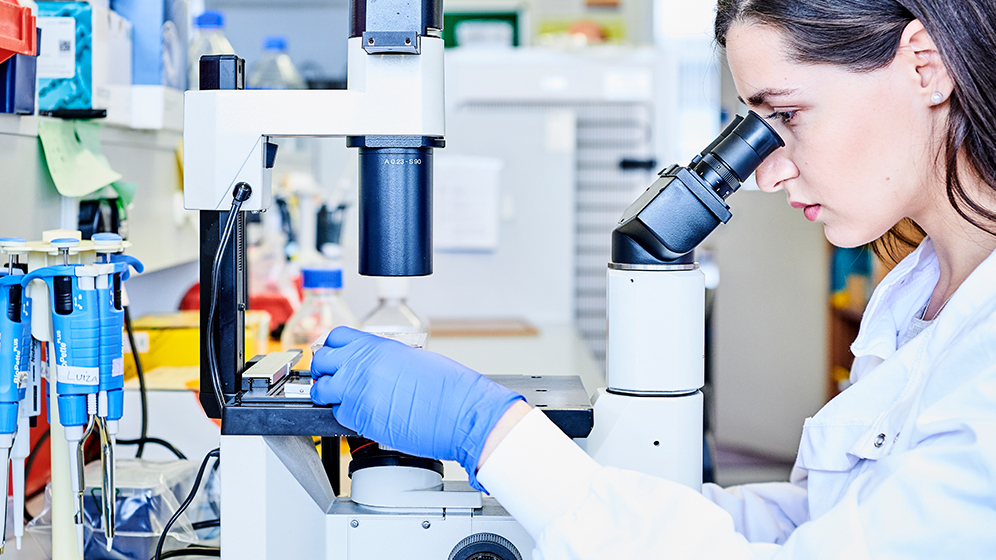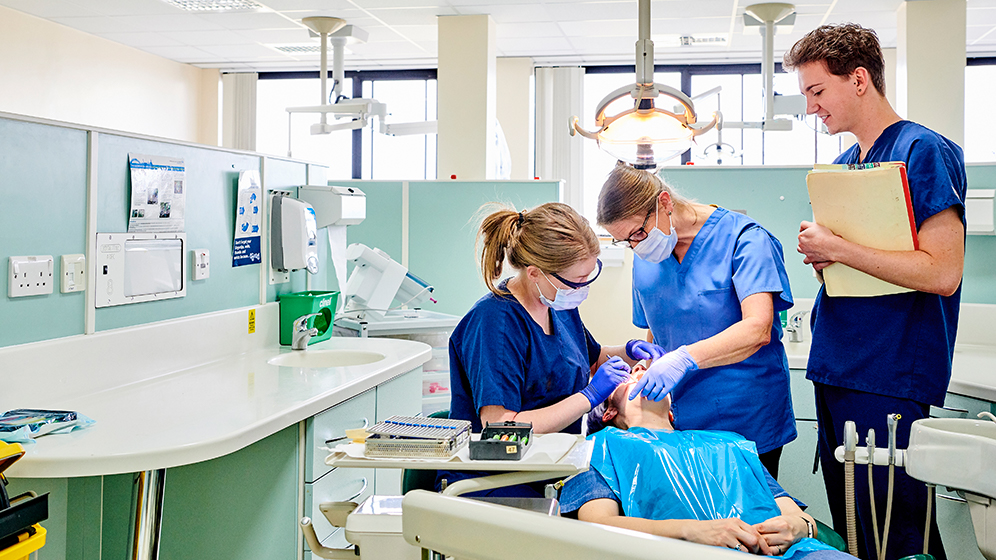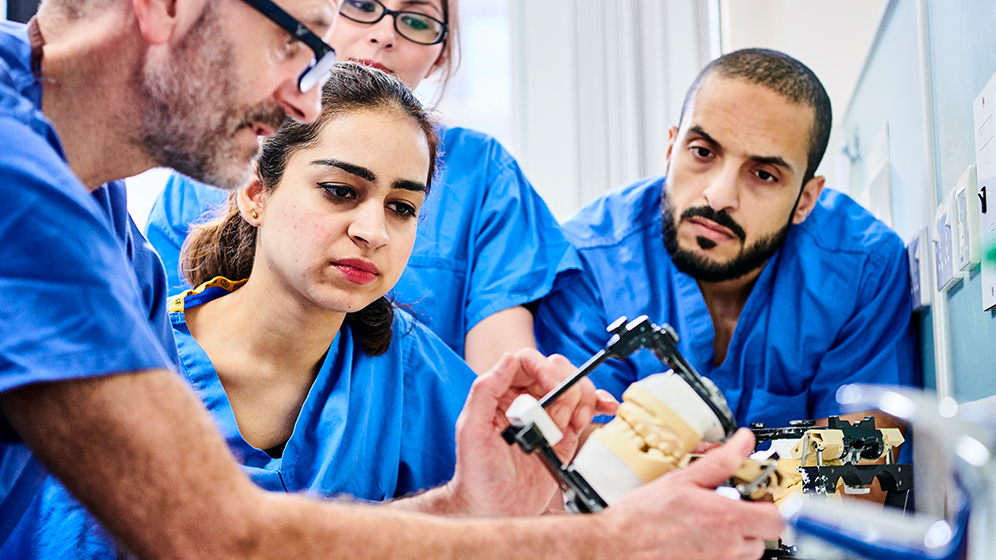Dental Surgery BDS
- UCAS code: A206
- Full time
- 5 years
Dentistry involves the treatment and prevention of a wide range of diseases of the mouth – from tooth decay to oral cancer.
You are currently viewing course information for entry year: 2026
Next start date:
- September 2026
UCAS Institution name and code:
- NEWC / N21
Course overview
This degree is professionally accredited by the General Dental Council. It entitles graduates to practise anywhere in the UK and in many other countries.
At Newcastle, our work has worldwide impact. You'll be taught by some of the top academics and internationally renowned experts in their field.
You'll study and practise in world-class facilities including our hi-tech Clinical Simulation Unit. You'll also attend lectures and clinics in purpose-built facilities at one of the largest integrated teaching and hospital complexes in the country.
This course involves high levels of clinical practice in our specialist clinics, alongside theoretical aspects of dentistry, covering:
- Sciences related to dentistry
- Human health, disease, and behaviour
- Clinical dental studies
- Professionalism and ethics
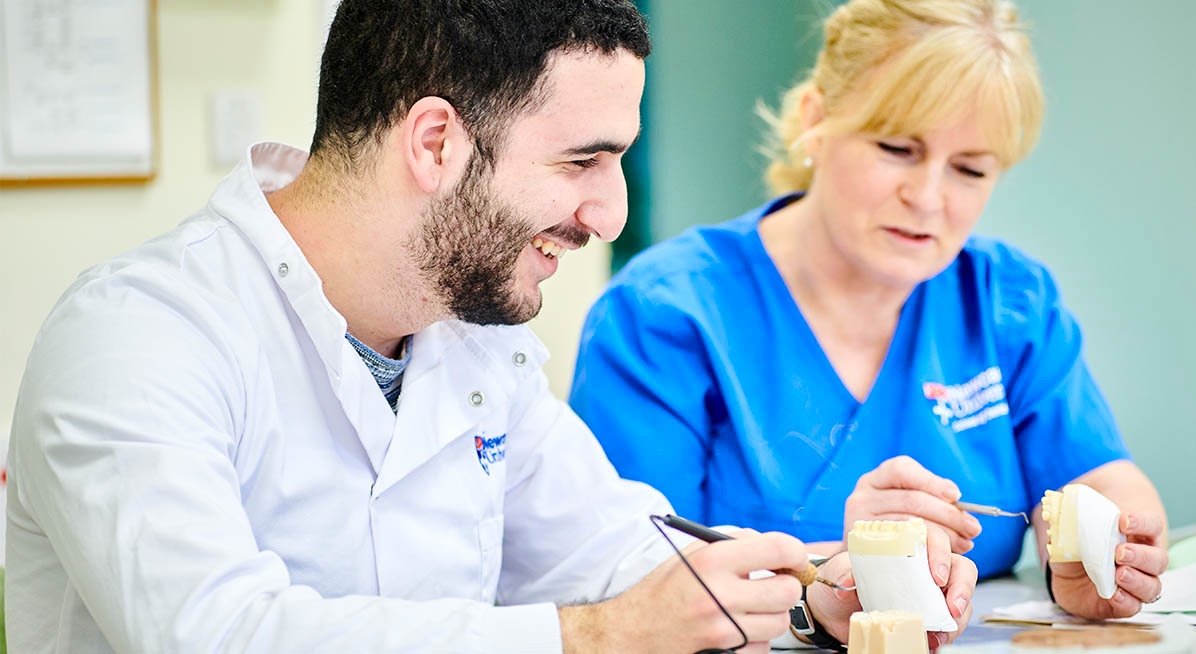
Your course and study experience - disclaimers and terms and conditions
Please rest assured we make all reasonable efforts to provide you with the programmes, services and facilities described. However, it may be necessary to make changes due to significant disruption, for example in response to Covid-19.
View our Academic experience page, which gives information about your Newcastle University study experience for the academic year 2025-26.
See our terms and conditions and student complaints information, which gives details of circumstances that may lead to changes to programmes, modules or University services.
Quality and ranking
Professional accreditation and recognition
All professional accreditations are reviewed regularly by their professional body.
Modules and learning
Modules
The information below is intended to provide an example of what you will study.
Most degrees are divided into stages. Each stage lasts for one academic year, and you'll complete modules totalling 120 credits by the end of each stage.
Our teaching is informed by research. Course content may change periodically to reflect developments in the discipline, the requirements of external bodies and partners, and student feedback.
Optional module availability
Student demand for optional modules may affect availability.
Full details of the modules on offer will be published through the Programme Regulations and Specifications ahead of each academic year. This usually happens in May.
To find out more please see our terms and conditions
Please note that this programme does not offer optional modules.
Stage 1 provides knowledge and understanding of a range of subjects that form the scientific basis of dentistry.
Subjects studied include:
- cell biology
- metabolism and homeostasis
- anatomy of the head and neck
- interpersonal skills and communication
- dental physiology
- neurobiology
We promote early clinical exposure. Later in Stage 1 you will shadow senior students on the clinics to observe treatment of patients and to start to relate the knowledge you are acquiring to clinical problems.
Stage 2 builds upon the foundations of Stage 1. It differs by focusing more on the scientific background to evidence-based dentistry. It will also provide the knowledge and understanding to support your clinical training.
You will study the following subjects:
- immunology and health
- basic pharmacology
- craniofacial and tooth biology
- behavioural science
- microbiology for the dental team
- dental materials science
Towards the end of Stage 2 you will undertake training in various clinical procedures. These include periodontal management and the initial stages of root treatments, and using phantom heads with artificial teeth. The training also involves other important aspects of patient care including communication skills and reflection. This training is vital preparation before taking responsibility for your own patients in Stage 3.
In Stage 3, you'll start managing your own patients by providing simple treatment under close supervision.
You'll learn how to:
- prevent disease
- plan treatment
- treat dental decay and place fillings
- undertake root treatments
- treat gum disease
- make dentures
You also learn how to extract teeth and even undertake simple surgery. We teach you how to use radiographs (X-rays) safely, to administer local anaesthetics, and how to deal with problems of cross-infection.
Initially the teaching of the different clinical disciplines is kept separate, but as the course progresses your cases will become increasingly complex and demand greater integration between the various skills.
Stage 3 courses in pathology and microbiology will give you an initial grounding in disease processes. You'll also have lectures and further practical courses in areas such as:
- radiology
- preventive dentistry and public health
- periodontology
- crown and bridgework
- advanced endodontics
- gerodontology
- oral medicine.
By the end of Stage 4, you'll be spending approximately half of your time on patient care and clinical dental practice, with supporting clinical-related teaching.
In stages 4 and 5 you'll be exposed to advanced techniques such as orthodontics, dental implants and intravenous sedation. Your clinical commitments will occupy much of your time, especially in the later years, but the teaching of important theoretical aspects of dentistry continues.
In stages 4 and 5 you'll be exposed to advanced techniques such as orthodontics, dental implants and intravenous sedation. Your clinical commitments will occupy much of your time, especially in the later years, but the teaching of important theoretical aspects of dentistry continues.
We base these figures and graphs on the most up-to-date information available to us. They are based on the modules chosen by our students in 2024-25.
Teaching time is made up of:
- scheduled learning and teaching activities. These are timetabled activities with a member of staff present.
- structured guided learning. These are activities developed by staff to support engagement with module learning. Students or groups of students undertake these activities without direct staff participation or supervision
Intercalation opportunities
Our dental students have the opportunity to enrich their personal and professional development further by taking time out of their dental studies to pursue an intercalated degree.
Intercalation provides an opportunity to study a subject that interests and excites you as well as develop new perspectives on healthcare delivery, research and education. We offer a broad range of Biomedical Science BSc degrees and masters' degrees that cover aspects of dental practice.
We encourage you to develop skills that will be useful throughout your future career and offer options to undertake your own research project.
Find out more about intercalated study on the Faculty of Medical Sciences website.
Electives
At the end of Stage 4, you have the opportunity to undertake a period of elective study, exploring a topic of particular interest to you in depth. This can be anywhere in the world and is a great opportunity to experience dentistry in another country.
Teaching and assessment
Teaching methods
Teaching is by a combination of:
- lectures and seminars
- laboratory demonstrations (including closed-circuit TV)
- practical laboratory work
- clinical demonstrations
Assessment methods
You'll be assessed through a combination of:
-
Assessments
-
Assignments – written or fieldwork
-
Case studies
-
Coursework
-
Essays
-
Examinations – practical or online
-
Group work
-
Interviews
-
Portfolio submission
-
Practical sessions
-
Presentations
-
Projects
-
Reflective report/journal
-
Reports
-
Seminar tasks/exercises
Skills and experience
Clinical dental practice
Time in clinical practice increases as you progress through the course.
In Stage 1, you'll observe simple procedures such as fillings and root treatments, and see patients in the Dental Hospital while shadowing a senior student.
In Stage 3 you'll start managing your own patients under close supervision.
In stages 4 and 5 you'll be exposed to advanced treatment techniques including dental implants and intravenous sedation. By the end of Stage 4, you'll be spending approximately half of your time on patient care.
You'll gain experience in a full range of dental procedures, with clinics run by specialists in:
- oral and maxillofacial surgery
- oral medicine
- paediatric dentistry
- orthodontics
- restorative dentistry
You can find out more about clinical dental practice on the School website, where you can also read about a day in the life of one of our dental students.
Business skills
An integrated course on Professionalism and Personal and Professional Development runs through all stages of this course.
Facilities and environment
Facilities
Based within Newcastle Dental Hospital, the School of Dental Sciences at Newcastle is among the most advanced in the country. Thanks to a £5.5 million investment, our new Dental Clinical Simulation Facilities are purpose-built and equipped with state-of-the-art technology. By training in one of the largest integrated teaching and hospital complexes in the UK, you'll gain a true insight into your future profession.
Our School is part of the Faculty of Medical Sciences, which is also home to Medicine, Biomedical Sciences, Psychology and Pharmacy, encouraging inter-professional collaboration.
Clinical training facilities
You'll access cutting-edge clinical training facilities, comprising of a:
- conservation clinic
- cell and molecular biosciences laboratory
- children's clinic
- clinical skills unit
- Fell Cluster
- dental learning resource unit
Research laboratories
Within the School there are a range of research laboratories, undertaking work in:
- oral biology
- anthropology
- dental materials science
We also have a dedicated clinical research facility. We can offer clinical training and research opportunities of the highest international standard.
Find out about our laboratories and research facility at the School of Dental Sciences.
We also foster strong collaboration with research institutes in the Medical School and University.
Take a virtual tour of our dental teaching and learning facilities.
Support
You'll have the support of an academic member of staff as a personal tutor throughout your degree to help with academic and personal issues.
Peer mentors will help you in your first year. They are fellow students who can help you settle in and answer any questions you have, when starting university.
Your future
Once graduates of our Dental Surgery BDS degree have qualified, and subject to registration with the GDC, there are a number of different careers open to you. Everybody needs to undergo a period of foundation training, whatever branch of dentistry they initially take up.
Dentistry is a fairly flexible career and selecting one particular branch does not mean that you cannot venture into others later on in your career. Advice, to help you make the appropriate choice, is available from your tutor as well as other members of staff and through our links with Health Education England.
You could go into:
- general practice - most graduates initially join a Dental Foundation Programme where you will join an established practice and work with a trainer who will guide you in those early months
- publicly funded services - the Community Dental Service is a complementary service to the general dental services. Dental Officers working in this publicly funded service provide dental care for those people either unwilling or unable to obtain care elsewhere
- teaching students in universities
- providing specialist care in hospitals
Make a difference
Sorry, you need JavaScript to view this video
Careers support
Our Careers Service is one of the largest and best in the country, and we have strong links with employers. We provide an extensive range of opportunities to all students through our ncl+ initiative.
Visit our Careers Service website
Recognition of professional qualifications outside of the UK
If you’re studying an accredited degree and thinking about working in Europe after you graduate, the best place to find current information is the UK Government’s guidance on recognition of UK professional qualifications in EU member states. This official resource explains whether your profession is regulated in another country, what steps you need to take, and which organisation you should contact.
Entry requirements
All candidates are considered on an individual basis and we accept a broad range of qualifications.
The entrance requirements and offers below apply to 2026 entry.
| A-Level | |
|---|---|
| International Baccalaureate | |
|---|---|
Other UK and the Republic of Ireland qualifications
Alternative offers at Newcastle
Through one of our contextual or alternative offer routes, you could receive an offer of up to three grades lower than the typical requirements.
Contextual offers
We use certain contextual data from your UCAS form, alongside your application, to consider challenges that you may have faced in your education and the potential effect this may have had on your qualifications. This means you may be eligible to receive a lower contextual offer.
PARTNERS offers
One of the largest and longest support entry routes to university of its kind for students from underrepresented backgrounds. We support applicants from application through to study.
Realising Opportunities offers
A unique programme delivered in collaboration with 10 leading, research-intensive universities in the UK. The programme is open to students in Year 12/first year of college.
Pathways to Newcastle offers
Pathways to Newcastle, our national skills entry route, is available for specific subject areas.
High Performance Athletes
We support promising athletes at the application stage, who compete in regional, national or international levels in their sport.
Qualifications from outside the UK
English Language requirements
Entrance courses (INTO)
International Pathway courses are specialist programmes designed for international students who want to study in the UK. We provide a range of study options for international students in partnership with INTO.
These courses are specifically designed for international students who want to study in the UK and progress onto one of our undergraduate degrees. Our International Study Centre, has a range of study options including:
- International Foundation
- International Year One
- English Language courses
Find out more about International Pathway courses
Admissions policy
This policy applies to all undergraduate and postgraduate admissions at Newcastle University. It is intended to provide information about our admissions policies and procedures to applicants and potential applicants, to their advisors and family members, and to staff of the University.
University Admissions Policy and related policies and procedures
Credit transfer and Recognition of Prior Learning
Recognition of Prior Learning (RPL) can allow you to convert existing relevant university-level knowledge, skills and experience into credits towards a qualification. Find out more about the RPL policy which may apply to this course.
School of Dental Sciences Admissions Policy
Please download and read the School of Dental Sciences Admissions Policy 2026 (PDF: 466KB) to find out more about:
- health requirements for admissions and continuing practice
- occupational health
- Disclosure and Barring Service (DBS) checks
- work experience
- resits
- other academic achievements and admissions criteria
University Clinical Aptitude Test (UCAT)
All applicants are required to sit the UK Clinical Aptitude Test (UCAT) in the year of application. The UCAT threshold may differ in each admissions cycle as it is dependent on the scores achieved by those applicants who apply to our Dental School in the current cycle. Therefore information on what the threshold is, is not available to prospective students.
For further information:
- visit the University Clinical Aptitude Test website
- download this Overview of Application Numbers and UCAT Thresholds document
Tuition fees and scholarships
Tuition fees for academic year 2026-2027
The 2026 entry home fees have not yet been confirmed.
| Qualification: BDS | |
|---|---|
|
Home students full time 5 years |
Tuition fees (Year 1)
Not set |
|
International students full time 5 years |
Tuition fees (Year 1)
47,400 |
Year abroad and additional costs
For programmes where you can spend a year on a work placement or studying abroad, you will receive a significant fee reduction for that year.
Some of our degrees involve additional costs which are not covered by your tuition fees.
Scholarships
Find out more about:
Open days and events
You'll have a number of opportunities to meet us throughout the year at our on-campus and virtual open days.
You'll be able to:
- explore our beautiful campus
- find out about our vibrant city
- discover what students think about studying at Newcastle
You'll also have the opportunity to speak to academic staff and find out more about the subjects you're interested in.
Find out about how you can visit Newcastle in person and virtually.
We regularly travel overseas to meet with students interested in studying at Newcastle University. Visit our events calendar to find out when we're visiting your region.
How to apply
Apply through UCAS
To apply for undergraduate study at Newcastle University, you must use the online application system managed by the Universities and Colleges Admissions Service (UCAS). All UK schools and colleges, and a small number of EU and international establishments, are registered with UCAS. You will need:
- the UCAS name and institution codes for Newcastle University (NEWC/N21)
- the UCAS code for the course you want to apply for
- the UCAS 'buzzword' for your school or college
If you are applying independently, or are applying from a school or college which is not registered to manage applications, you will still use the Apply system. You will not need a buzzword.
Apply through UCASApply through an agent
International students often apply to us through an agent. Have a look at our recommended agents and get in touch with them.
UCAS admission procedure for Dentistry
You are permitted a maximum of four choices on the UCAS form for Dentistry.
The deadline for applications is 15 October 2025. Candidates who are considered, on the basis of their application form, to be particularly promising are interviewed to establish suitability for the course prior to an offer being made.
Get in touch
By phone
Call us on +44 (0) 191 208 3333 and press option 1. Our opening hours are Monday to Friday 10am until 4pm.
Live chat
Our NCL chatbot might be able to give you an answer straight away. If not, it’ll direct you to someone who can help.
You'll find our NCL chatbot in the bottom right of this page.
Online
Chat to our students
Choosing a university is a big decision. If you've got questions about a particular course, student life or the city of Newcastle, why not chat to our friendly students or graduates!
Keep updated
We regularly send email updates and extra information about the University.
Receive regular updates by email












